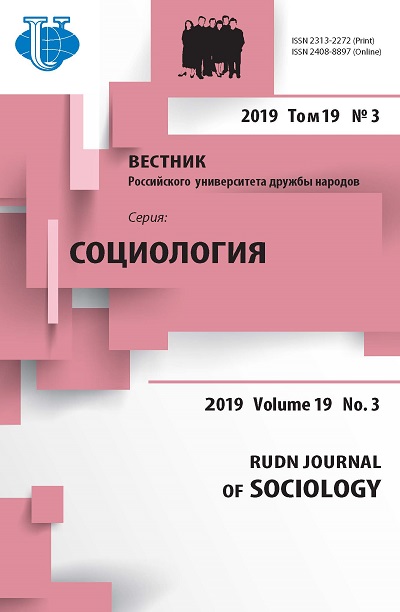Indigeneity in the context of globalization: epistemological and sociocultural aspects
- Authors: Kuropjatnik M.S.1
-
Affiliations:
- Saint Petersburg State University
- Issue: Vol 19, No 3 (2019)
- Pages: 387-396
- Section: Theory, Methodology and History of Sociological Research
- URL: https://journals.rudn.ru/sociology/article/view/21674
- DOI: https://doi.org/10.22363/2313-2272-2019-19-3-387-396
Cite item
Full Text
Abstract
In recent decades, the “indigenization of modernity” has become one of the significant trends of the reconfiguration of landscapes of social and cultural diversity. In its contemporary meaning, the concept of indigeneity expresses the desire of indigenous peoples and various social and cultural communities, formerly marginalized within the borders of national states, to independently determine their development. From the global perspective, indigeneity is no longer associated with certain types of societies or cultural scripts of authenticity and traditional lifestyles. Indigenous actors cease to play the role of the Other in contemporary discourses and intellectual life of the West. The transition from the genealogical model of indigeneity based on the ideas of origin, kinship and cultural authenticity to the relational model allows to shift the focus from the features of the indigenous ones to the relationships between indigenous and non-indigenous actors. Indigenous peoples constitute and represent their culture taking into account public opinion, national legislation and international conventions, which leads to the fundamental transformation of the actors themselves. Their characteristics can no longer be represented only in terms of primordiality. Under globalization, the cultural patterns of indigeneity are diverse and conceptualized on the basis of new approaches to the study of the social organization of cultural diversity and models of its management. The concepts “partial relations”, “entanglement” and “intercultural relations” constitute the discourse of indigeneity, which implies recognition of multiple partial relations connecting subject and object, indigenous and non-indigenous worlds and cultural practices. Changes in the discourse of indigeneity both in social-cultural and epistemological aspects are also associated with reconfiguration of the thematic field of social anthropology.
About the authors
M. S. Kuropjatnik
Saint Petersburg State University
Author for correspondence.
Email: kuropjatnik@bk.ru
доктор социологических наук, заведующая кафедрой культурной антропологии и этнической социологии Санкт-Петербургского государственного университета
Universitetskaya Nab., 7-9, Saint Petersburg, 199034, RussiaReferences
- Arendt H. Otvetstvennost i suzhdenie [Responsibility and Judgment]. Moscow: Izd-vo Instituta Gaydara; 2013 (In Russ.).
- Balzer M.M. Korennye kosmopolity, ekologicheskaya zashchita i aktivizm v Sibiri i na Dalnem Vostoke [Indigenous cosmopolitans, ecological defense, and activism in Russia’s Siberia and the Far East]. Sibirskie Istoricheskie Issledovaniya. 2014; 2 (In Russ.).
- Bevernage B. Allokhronizm, ravenstvo vo vremeni i sovremennost. Kritika proekta radikalnoy sovremennosti Johannesa Fabiana i dovody v polzu novoy politiki vremeni [Allochronism, coevalness and modernity. Criticism of the project of radical modernity by Johannes Fabian and the arguments in favor of the new time policy]. Sotsiologoya Vlasti. 2016; 2 (In Russ.).
- Calhoun C. Natsionalizm [Nationalism]. Moscow: Territoriya budushchego; 2006 (In Russ.).
- Said E. Orientalizm. Zapadnye kontseptsii Vostoka [Orientalism. Western Conceptions of the Orient]. Saint Petersburg: Russky mir; 2006 (In Russ.).
- Funk D.A. Vvedenie k spetsialnoy teme nomera [Introducing the theme]. Sibirskie Istoricheskie Issledovaniya. 2014; 2 (In Russ.).
- Appadurai A. Putting hierarchy in its place. Cultural Anthropology. 1988; 3 (1).
- Beach H. Self-determining the Self: Aspects of Saami identity management in Sweden. Acta Borealia. Nordic Journal of Circumpolar Societies. 2007; 24 (1).
- Beteille A. The idea of indigenous people. Current Anthropology. 1998; 39 (2).
- Bunzl M. Foreword: Johannes Fabian’s time and Other: Synthesis of critical anthropology. Fabian J. Time and the Other. How Anthropology Makes its Object. New York: Columbia University Press; 2002.
- Clifford J. Returns. Becoming Indigenous in the Twenty-First Century. Cambridge: Harvard University Press; 2013.
- Clifford J., Marcus G. (Eds.) Writing Culture: The Poetics and Politics of Ethnography. Berkeley: University of California Press; 1986.
- Dussart F., Poirier S. Knowing and Managing the Land: The Conundrum of Coexistence and Entanglement. Dussart F., Poirier S. (Eds.) Entangled Territorialities. Negotiating Indigenous Lands in Australia and Canada. Toronto: University of Toronto Press; 2017.
- Fabian J. Time and the Other. How Anthropology Makes its Object. New York: Columbia University Press; 2002.
- Friedman J. Indigeneity: Anthropological notes on a historical variable. Minde H. (Ed.) Indigenous Peoples. Self-Determination. Knowledge. Indigeneity. Eburon: Eburon Akademik Publishers; 2007.
- Hannerz U. Transnational Connections. Culture, People, Places. London — New York: Routledge; 1996.
- Karlsson B. Anthropology and the “indigenous slot”. Claims to debates about indigenous people’s status in India. Critique of Anthropology. 2003; 23 (4).
- Li T.M. Articulating indigenous identity in Indonesia: Resource politics and the tribal slot. Comparative Studies in Society and History. 2000; 42 (1).
- Merlan F. Indigeneity: Global and local. Current Anthropology. 2009; 50 (3).
- Merlan F. Theorizing relationality: A response to the Morphys. American Anthropologist. 2013; 115 (4).
- Narayan K. How native is a ‘native’ anthropologist? American Anthropologist. 1993; 95 (3).
- Niezen R. A World Beyond Difference. Cultural Identity in the Age of Globalization. Oxford: Blackwell Publishing; 2004.
- Peterson N. Is there a role for anthropology in cultural reproduction? Maps, mining and the “cultural future” in Central Australia. Dussart F., Poirier S. (Eds.) Entangled Territorialities. Negotiating Indigenous Lands in Australia and Canada. Toronto: University of Toronto Press; 2017.
- Poirier S. Nehirowisiw territoriality: Negotiating and managing entanglement and coexistence. Dussart F., Poirier S. (Eds.) Entangled Territorialities. Negotiating Indigenous Lands in Australia and Canada. Toronto: University of Toronto Press; 2017.
- Robbins J. Beyond the suffering subject: Toward an anthropology of the good. Journal of the Royal Anthropological Institute. 2013; 19 (3).
- Sahlins M. Two or three things that I know about culture. Journal of the Royal Anthropological Institute. 1999; 5.
- Strathern M. (Ed.) Shifting Contexts. Transformations in Anthropological Knowledge. London — New York: Routledge; 1995.
- Strathern M. Partial Connections, Updated Edition. Walnut Creek: AltaMira Press; 2004.
- Trouillot M.-R. Global Transformations. Anthropology and the Modern World. New York: Palgrave Macmillan; 2003.
- Zapata-Barrero R. Interculturalism: main hypothesis, theories and strands. Zapata-Barrero R. (Ed.) Interculturalism in Cities: Concept, Policy and Implementation. Cheltenham: Edward-Elgar Publishing; 2015.














